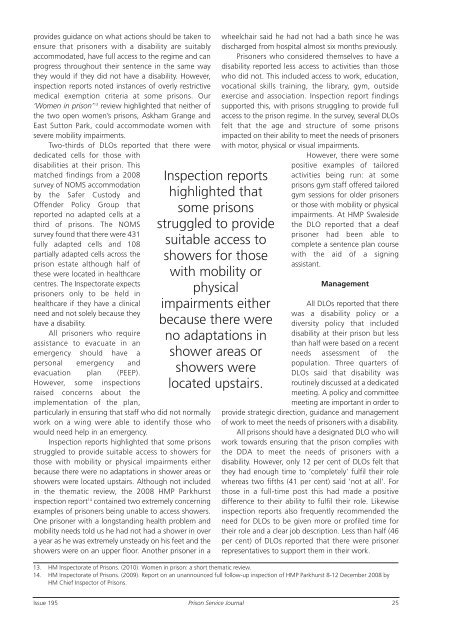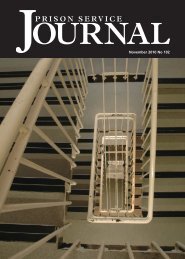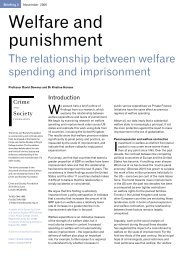Focus on Disability
Focus on Disability
Focus on Disability
Create successful ePaper yourself
Turn your PDF publications into a flip-book with our unique Google optimized e-Paper software.
provides guidance <strong>on</strong> what acti<strong>on</strong>s should be taken to<br />
ensure that pris<strong>on</strong>ers with a disability are suitably<br />
accommodated, have full access to the regime and can<br />
progress throughout their sentence in the same way<br />
they would if they did not have a disability. However,<br />
inspecti<strong>on</strong> reports noted instances of overly restrictive<br />
medical exempti<strong>on</strong> criteria at some pris<strong>on</strong>s. Our<br />
‘Women in pris<strong>on</strong>’ 13 review highlighted that neither of<br />
the two open women’s pris<strong>on</strong>s, Askham Grange and<br />
East Sutt<strong>on</strong> Park, could accommodate women with<br />
severe mobility impairments.<br />
Two-thirds of DLOs reported that there were<br />
dedicated cells for those with<br />
disabilities at their pris<strong>on</strong>. This<br />
matched findings from a 2008<br />
survey of NOMS accommodati<strong>on</strong><br />
by the Safer Custody and<br />
Offender Policy Group that<br />
reported no adapted cells at a<br />
third of pris<strong>on</strong>s. The NOMS<br />
survey found that there were 431<br />
fully adapted cells and 108<br />
partially adapted cells across the<br />
pris<strong>on</strong> estate although half of<br />
these were located in healthcare<br />
centres. The Inspectorate expects<br />
pris<strong>on</strong>ers <strong>on</strong>ly to be held in<br />
healthcare if they have a clinical<br />
need and not solely because they<br />
have a disability.<br />
All pris<strong>on</strong>ers who require<br />
assistance to evacuate in an<br />
emergency should have a<br />
pers<strong>on</strong>al emergency and<br />
evacuati<strong>on</strong> plan (PEEP).<br />
However, some inspecti<strong>on</strong>s<br />
raised c<strong>on</strong>cerns about the<br />
implementati<strong>on</strong> of the plan,<br />
particularly in ensuring that staff who did not normally<br />
work <strong>on</strong> a wing were able to identify those who<br />
would need help in an emergency.<br />
Inspecti<strong>on</strong> reports highlighted that some pris<strong>on</strong>s<br />
struggled to provide suitable access to showers for<br />
those with mobility or physical impairments either<br />
because there were no adaptati<strong>on</strong>s in shower areas or<br />
showers were located upstairs. Although not included<br />
in the thematic review, the 2008 HMP Parkhurst<br />
inspecti<strong>on</strong> report 14 c<strong>on</strong>tained two extremely c<strong>on</strong>cerning<br />
examples of pris<strong>on</strong>ers being unable to access showers.<br />
One pris<strong>on</strong>er with a l<strong>on</strong>gstanding health problem and<br />
mobility needs told us he had not had a shower in over<br />
a year as he was extremely unsteady <strong>on</strong> his feet and the<br />
showers were <strong>on</strong> an upper floor. Another pris<strong>on</strong>er in a<br />
Inspecti<strong>on</strong> reports<br />
highlighted that<br />
some pris<strong>on</strong>s<br />
struggled to provide<br />
suitable access to<br />
showers for those<br />
with mobility or<br />
physical<br />
impairments either<br />
because there were<br />
no adaptati<strong>on</strong>s in<br />
shower areas or<br />
showers were<br />
located upstairs.<br />
wheelchair said he had not had a bath since he was<br />
discharged from hospital almost six m<strong>on</strong>ths previously.<br />
Pris<strong>on</strong>ers who c<strong>on</strong>sidered themselves to have a<br />
disability reported less access to activities than those<br />
who did not. This included access to work, educati<strong>on</strong>,<br />
vocati<strong>on</strong>al skills training, the library, gym, outside<br />
exercise and associati<strong>on</strong>. Inspecti<strong>on</strong> report findings<br />
supported this, with pris<strong>on</strong>s struggling to provide full<br />
access to the pris<strong>on</strong> regime. In the survey, several DLOs<br />
felt that the age and structure of some pris<strong>on</strong>s<br />
impacted <strong>on</strong> their ability to meet the needs of pris<strong>on</strong>ers<br />
with motor, physical or visual impairments.<br />
However, there were some<br />
positive examples of tailored<br />
activities being run: at some<br />
pris<strong>on</strong>s gym staff offered tailored<br />
gym sessi<strong>on</strong>s for older pris<strong>on</strong>ers<br />
or those with mobility or physical<br />
impairments. At HMP Swaleside<br />
the DLO reported that a deaf<br />
pris<strong>on</strong>er had been able to<br />
complete a sentence plan course<br />
with the aid of a signing<br />
assistant.<br />
Management<br />
All DLOs reported that there<br />
was a disability policy or a<br />
diversity policy that included<br />
disability at their pris<strong>on</strong> but less<br />
than half were based <strong>on</strong> a recent<br />
needs assessment of the<br />
populati<strong>on</strong>. Three quarters of<br />
DLOs said that disability was<br />
routinely discussed at a dedicated<br />
meeting. A policy and committee<br />
meeting are important in order to<br />
provide strategic directi<strong>on</strong>, guidance and management<br />
of work to meet the needs of pris<strong>on</strong>ers with a disability.<br />
All pris<strong>on</strong>s should have a designated DLO who will<br />
work towards ensuring that the pris<strong>on</strong> complies with<br />
the DDA to meet the needs of pris<strong>on</strong>ers with a<br />
disability. However, <strong>on</strong>ly 12 per cent of DLOs felt that<br />
they had enough time to ‘completely’ fulfil their role<br />
whereas two fifths (41 per cent) said ‘not at all’. For<br />
those in a full-time post this had made a positive<br />
difference to their ability to fulfil their role. Likewise<br />
inspecti<strong>on</strong> reports also frequently recommended the<br />
need for DLOs to be given more or profiled time for<br />
their role and a clear job descripti<strong>on</strong>. Less than half (46<br />
per cent) of DLOs reported that there were pris<strong>on</strong>er<br />
representatives to support them in their work.<br />
13. HM Inspectorate of Pris<strong>on</strong>s. (2010). Women in pris<strong>on</strong>: a short thematic review.<br />
14. HM Inspectorate of Pris<strong>on</strong>s. (2009). Report <strong>on</strong> an unannounced full follow-up inspecti<strong>on</strong> of HMP Parkhurst 8-12 December 2008 by<br />
HM Chief Inspector of Pris<strong>on</strong>s.<br />
Issue 195 Pris<strong>on</strong> Service Journal<br />
25











